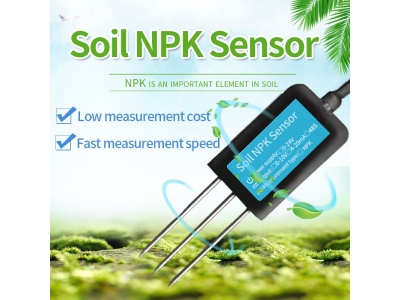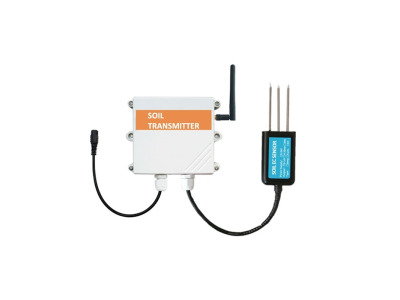Soil health plays a crucial role in agriculture, ecosystem sustainability, and food security. Understanding the soil's physical, chemical, and biological properties is essential for optimizing agricultural practices, improving crop yields, and conserving natural resources. Traditional soil analysis methods can be time-consuming and labor-intensive, often providing limited information. However, advancements in soil sensor technology have revolutionized soil health analysis, enabling real-time and precise monitoring of soil properties. This article explores the benefits of advanced soil sensor technology, its applications in agriculture, and the future prospects of this revolutionary approach.
Real-Time Monitoring of Soil Properties:
Traditional soil analysis involves collecting samples and sending them to laboratories for analysis, which can take days or even weeks to obtain results. In contrast, advanced soil sensor technology allows for real-time monitoring of soil properties directly in the field. Soil sensors equipped with various probes can measure parameters such as moisture content, pH levels, electrical conductivity, temperature, and nutrient availability. This instant data availability helps farmers make informed decisions regarding irrigation, fertilization, and pest management.

Precision Agriculture and Resource Optimization:
Advanced soil sensors enable precision agriculture practices by providing detailed information about soil heterogeneity within a field. By mapping soil properties at high resolution, farmers can apply inputs like water, fertilizers, and pesticides more precisely, optimizing their usage and minimizing waste. This targeted approach not only reduces environmental contamination but also increases crop productivity by tailoring agricultural practices to the specific needs of different soil areas within a field.
Early Detection of Soil Issues:
Timely detection of soil issues is crucial for preventing crop yield losses. Soil sensors can detect early signs of nutrient deficiencies, water stress, soil compaction, salinity, and other soil-related problems. By continuously monitoring soil conditions, farmers can intervene promptly, implementing appropriate measures to address these issues before they become severe. This proactive approach helps maintain soil health, sustain crop productivity, and reduce the reliance on reactive interventions.
Improved Nutrient Management:
Optimizing nutrient management is a critical aspect of sustainable agriculture. Soil sensors provide accurate and real-time data on nutrient levels in the soil, allowing farmers to adjust fertilizer application rates according to the specific nutrient requirements of crops. This precision approach minimizes nutrient runoff, reduces environmental pollution, and improves nutrient use efficiency. Furthermore, soil sensors help identify nutrient imbalances, enabling farmers to correct deficiencies or excesses promptly, thereby enhancing crop quality and minimizing yield loss.
Environmental Impact and Conservation:
Advanced soil sensor technology contributes to environmental conservation by reducing the negative impacts of agricultural practices. By optimizing irrigation based on soil moisture measurements, farmers can significantly reduce water usage and conserve this precious resource. Precise nutrient application, as guided by soil sensors, minimizes nutrient leaching into groundwater and subsequent contamination. Additionally, by monitoring soil compaction and implementing appropriate measures, such as controlled traffic farming, soil erosion and degradation can be mitigated, promoting long-term sustainability.
Integration with Smart Farming Systems:
The integration of advanced soil sensors with other smart farming technologies further enhances their capabilities. Soil sensor data can be combined with information from weather stations, satellite imagery, and crop models to create comprehensive decision support systems. For example, by integrating soil moisture sensor data with weather forecasts, farmers can optimize irrigation scheduling and save water. Similarly, combining soil nutrient data with crop growth models allows for precise fertilization recommendations tailored to specific growth stages, improving nutrient use efficiency and reducing environmental impact.
Future Prospects and Challenges:
While advanced soil sensors have already revolutionized soil health analysis, there are ongoing efforts to improve their accuracy, affordability, and scalability. Miniaturization and wireless connectivity have made soil sensors more portable and adaptable for various field conditions. Efforts are also underway to integrate sensors with autonomous systems, such as robots and drones for automated and large-scale soil monitoring. The challenge lies in developing standardized protocols, calibration methods, and data interpretation models to ensure the accuracy and consistency of sensor readings across different soil types and regions.
Conclusion:
Advanced soil sensor technology has revolutionized soil health analysis by enabling real-time monitoring of soil properties. Its applications in precision agriculture, early detection of soil issues, nutrient management, and environmental conservation have immense benefits for sustainable farming practices. As technology continues to evolve, the integration of soil sensors with other smart farming technologies will further enhance their capabilities. With ongoing advancements and collaborative efforts, advanced soil sensor technology is set to play a pivotal role in optimizing agricultural practices, improving crop productivity, and ensuring the long-term sustainability of our precious soil resources.






